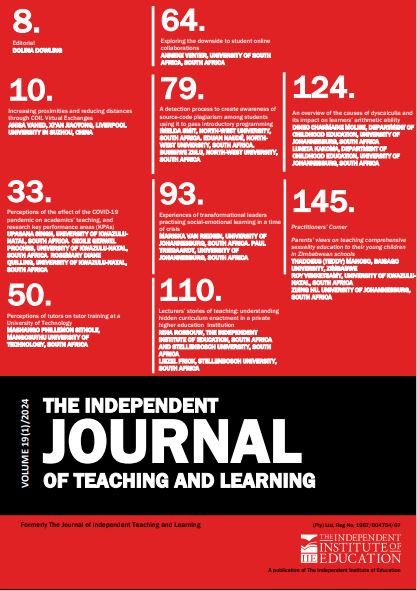Perceptions of the effect of the COVID-19 pandemic on academics’ teaching, and research key performance areas (KPAs)
DOI:
https://doi.org/10.17159/ijtl.v19i1.18850Keywords:
Key Performance Areas (KPA), Teaching, Research, Performance ManagementAbstract
The COVID-19 pandemic forced education systems and institutions to rethink how they operate. A new normal is emerging, where Higher Education Institutions (HEIs) are reshaping how they teach, assess and interact. This exploratory research highlights the need for institutions to embrace the tenets of University 4.0 while raising a number of issues related to how academics’ performance is measured, and thus consider if performance management systems are able to adapt in tandem. This paper presents the results of a study that set out to investigate perceptions of academics in a public higher educational institution in South Africa on the impact of the COVID-19 pandemic on their teaching and research key performance areas (KPAs) used in their institution, as these are used to monitor and manage academics. This study adopted a qualitative research approach with purposeful sampling so that a range of views from academics and leadership at this institution were included. The results suggest that where implemented, performance management needs to be realigned to the new approaches to teaching and research adopted by academics since the COVID-19 pandemic.
References
Abramo, G., D’Angelo, C.A. & Mele, I. (2022). Impact of COVID-19 on research output by gender across countries. Scientometrics, 1-16. Retrieved 20 June 2023 from https://link.springer.com/article/10.1007/s11192-021-04245-x
Batista, P., Afonso, A., Lopes, M., Fonseca, C., Oliveira-Silva, P., Pereira, A. & Pinho, L. (2022). Anxiety and coping stress strategies in researchers during pandemic. Frontiers in public health, 10, 850376.
Corbera, E., Anguelovski, I., Honey-Rosés, J. & Ruiz-Mallén, I. (2020). Academia in the time of: Towards an ethics of care. Planning Theory & Practice, 21(2), 191-199. Employment Value Proposition (EVP). s.a. Division of Human Resources, UKZN. Retrieved 29 September 2022 from https://hr.ukzn.ac.za/hrpeoplestrategy/ukzn-employment-value-proposition/
Filho, W., Wall, T., Rayman-Bacchus, L. et al. (2021). Impacts of and social isolation on academic staff and students at universities: a cross-sectional study. BMC Public Health 21, 1213 Retrieved 28 January 2023 from https://doi.org/10.1186/s12889-021-11040-z
Gundumogula, M. (2020). Importance of focus groups in qualitative research. The International Journal of Humanities & Social Studies, 8(11), 299-302.
Hedding, D.W., Greve, M., Breetzke, G.D., Nel, W. & Jansen van Vuuren, B. (2020). COVID-19 and the academe in South Africa: Not business as usual. South African Journal of Science, 116(7/8) Art. #8298, 8293 pages. Retrieved 28 January 2023 from https://doi.org/https://doi.org/10.17159/sajs.2020/8298
Hull, R. (2006). Workload allocation models and “collegiality” in academic departments. Journal of Organizational Change Management, 19(1), 38-53. https://doi:10.1108/09534810610643677
Kenny, J. & Fluck, A.E. (2022). Emerging principles for the allocation of academic work in universities. Higher Education, 83, 1371-1388. Retrieved 28 January 2023 from https://doi.org/https://doi.org/10.1007/s10734-021-00747-y
Kitzinger, J. (1995). Qualitative research: introducing focus groups. BMJ, 311(7000), 299-302.
Kulikowski, K., Przytuła, S. & Sułkowski, L. (2021). The motivation of academics in remote teaching during the COVID-19 pandemic in Polish universities – opening the debate on a new equilibrium in e-Learning. Sustainability 13(5), 2752. Retrieved 28 January 2023 from https://doi.org/10.3390/su13052752
Langa, P. (2015). Private higher education in Mozambique: an overview of a growing subsystem. Working Papers in Higher Education Studies, 1(2), 89-109.
McGaughey, F., Watermeyer, R., Shankar, K., Suri, V. R., Knight, C., Crick, T., Hardman, J., Phelan, D., & Chung, R. (2021). This can’t be the new norm’: academics’ perspectives on the COVID-19 crisis for the Australian university sector. Higher Education Research & Development, 41(7), 2231-2246.
Mintz, S. (2022). Do We Really Need New University Models? What’s missing from the proposed new educational models for the post-COVID era. Inside Higher Ed. Retrieved 23 June 2023 from https://www.insidehighered.com/blogs/higher-ed-gamma/do-we-really-need-new-university-models
Mosoge, M.J. & Pilane, M.W. (2014). Performance management: the neglected imperative of accountability systems in education. South African Journal of Education, 34(1), 1-18.
Nyoni, P. & Agbaje, O. (2022.) Fieldwork Dynamics in a Higher Education Setting amid the COVID-19 Pandemic. Critical Studies in Teaching and Learning (CriSTaL), 10(1), 63-77.
Nyumba, T.O, Wilson, K., Derrick, C.J. & Mukherjee, N. (2018). The use of focus group discussion methodology: Insights from two decades of application in conservation. Methods in Ecology and Evolution, 9(1), 20-32.
Pokhrel, S. & Chhetri, R. (2021). A literature review on impact of COVID-19 pandemic on teaching and learning. Higher Education for the Future, 8(1), 133-141.
Sahu, P. (2020). Closure of Universities Due to Coronavirus Disease 2019 (COVID-19): Impact on Education and Mental Health of Students and Academic Staff. Cureus, 12(4), e7541. https://doi:10.7759/cureus.7541
Sheikh, A Z., Chandler, J., Hussain, B. & Timmons, S. (2022). Performance measurement and management in the British higher education sector. Quality & Quantity, 56, 4809-4824. Retrieved 28 January 2023 from https://doi.org/https://doi.org/10.1007/s11135-022-01339-3
University. (2011). University of KwaZulu-Natal Framework for Teaching Workloads (SE/01/1008/11). Retrieved 23 June 2023 from https://uksu.ukzn.ac.za/Libraries/2014_UKSU_MEMBERSHIP_APPLICATION_FORM/2018_074_TWL_discussions.pdf
University. (2014). Research policy II – Developing, retaining and rewarding researchers. UKZN. Retrieved 28 January 2023 from https://ukzn.ac.za/about-ukzn/vision-and-mission/
UKZN. (2016). Evaluating Teaching as a Key Performance Area in the Performance Management System. Retrieved 23 June 2023 from https://www.google.com/url?sa=t&rct=j&q=&esrc=s&source=web&cd=&ved=2ahUKEwj11bTg4Nb_AhVzgv0HHeD-C00QFnoECCkQAQ&url=https%3A%2F%2Fuksu.ukzn.ac.za%2FLibraries%2F2014_UKSU_MEMBERSHIP_APPLICATION_FORM%2F2016_009_Apr_7_Annexure_4_Teaching_FILE_for_PMS_DRAFT_With_Template_for_consult_22Mar16.pdf&usg=AOvVaw0gx1kqHNt71I4TFbVLFIx6&opi=89978449
UKZN. (2022). Teaching and Learning Project Plan During the COVID-19-related Restrictions. Retrieved 23 June 2023 from https://www.google.com/url?sa=t&rct=j&q=&esrc=s&source=web&cd=&cad=rja&uact=8&ved=2ahUKEwj5rIyC-9H_AhXuif0HHVkIAA0QFnoECBsQAQ&url=https%3A%2F%2Fulop.ukzn.ac.za%2Fwp-content%2Fuploads%2F2022%2F08%2FProject-Plan-of-Action-For-Senate-New.pdf&usg=AOvVaw01mSEb-hKsjPGlcnZmnKn4&opi=89978449
Uleanya, C. & Alex, J. (2022). Impacts of COVID-19 Pandemic on Selected Rural University Students’ Emotional Lives: A South African Perspective from a Global Study. Journal of Culture and Values in Education, 5(1), 168-182. Wisker, G. & Robinson, G. (2016). Supervisor wellbeing and identity: challenges and strategies. International Journal for Researcher Development, 7(2), 123-140.
Downloads
Published
Issue
Section
License
Copyright (c) 2024 The Independent Journal of Teaching and Learning

This work is licensed under a Creative Commons Attribution 4.0 International License.






.png)